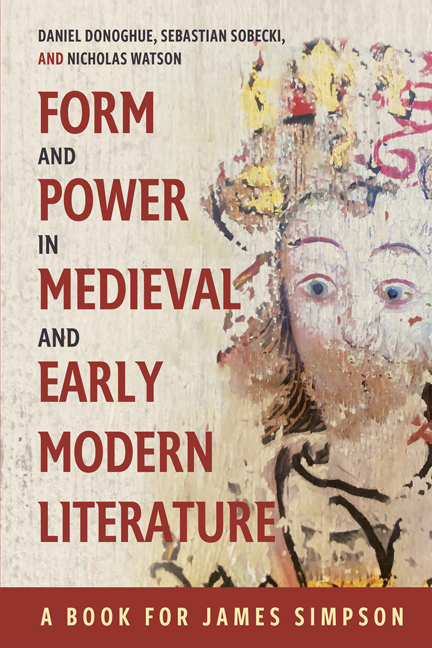Book contents
- Frontmatter
- Contents
- List of Illustrations
- Contributors and Editors
- Acknowledgments
- List of Abbreviations
- Simpson: An Interim Report
- PART I THE HERMENEUTICS OF RECOGNITION
- PART II GENRE AND FIGURE
- PART III CULTURE AND INSTITUTIONS
- PART IV REFORMATIONS
- James Simpson’s Publications from 1984 to 2024
- Bibliography
- A Note on the Bloomfield Conferences
- General Index
- Tabula Gratulatoria
8 - Catching at Words: The Literal, the Metaphorical, and the Obvious
Published online by Cambridge University Press: 17 May 2024
- Frontmatter
- Contents
- List of Illustrations
- Contributors and Editors
- Acknowledgments
- List of Abbreviations
- Simpson: An Interim Report
- PART I THE HERMENEUTICS OF RECOGNITION
- PART II GENRE AND FIGURE
- PART III CULTURE AND INSTITUTIONS
- PART IV REFORMATIONS
- James Simpson’s Publications from 1984 to 2024
- Bibliography
- A Note on the Bloomfield Conferences
- General Index
- Tabula Gratulatoria
Summary
CATCH/WORDS
This essay considers obviousness as both an expressive and hermeneutic mode, one long dismissed and yet oddly well-positioned to do humane work in the narrative-receiving and narrative-making work of the twenty-first century. This study of the obvious, though, involves parsing the relationship of obviousness to textual interpretation, a practice that often begins with terms like “literal” and “metaphorical.” Disentangling the material sense of a sentence from its symbolic or figurative rendering has long vexed the study of literature, and it has sometimes had history-inflecting effects, given the weaponization of interpretation by institutional interests and authorities. James Simpson's Burning to Read offers one such example in the case of Reformation England. Observing that “the literal sense” of a text is always already a “fairly tenuous fiction,” one shaped by “interpretive, unwritten assumptions of the interpretive community,” Simpson traces how the alluring hope of an absolute meaning, independent of its readers’ expectations and hermeneutic labors, can lead to fundamentalist approaches to texts. In Reformation England, the fantasy of a liberating literalism only entrenched the institutional powers entrusted with resolution of interpretive difference, and the result was centuries of sectarian violence among Catholic and Protestant denominations. While that case offers readers today a cautionary tale about the authoritarian creep of invoking the literal as self-evident or stable, plenty of early modern writers in their own moment perceived this danger clearly, developing language for this kind of motivated, sharp-bladed interpretation. By the late sixteenth and early seventeenth centuries, writers invoked a phrase for the implicitly strategic, often cynical, always interested interpretation of words without regard to their contextual valences – that is, a term for a perverse literalism: it was “to catch at words.” For example, Richard Bancroft, in a 1588 sermon, cites authority to complain of false, scholarly prophets: “If they catch but a word … they straight insult upon it … They wring and wrest the Scriptures according as they fansie.”2 Likewise, William Burton in 1602 decried those who listen to sermons “only to watch and catch, at a word and a halfe, taking only what will serue their turne (like the diuell himselfe) ….”
- Type
- Chapter
- Information
- Form and Power in Medieval and Early Modern LiteratureA Book for James Simpson, pp. 147 - 164Publisher: Boydell & BrewerPrint publication year: 2024

